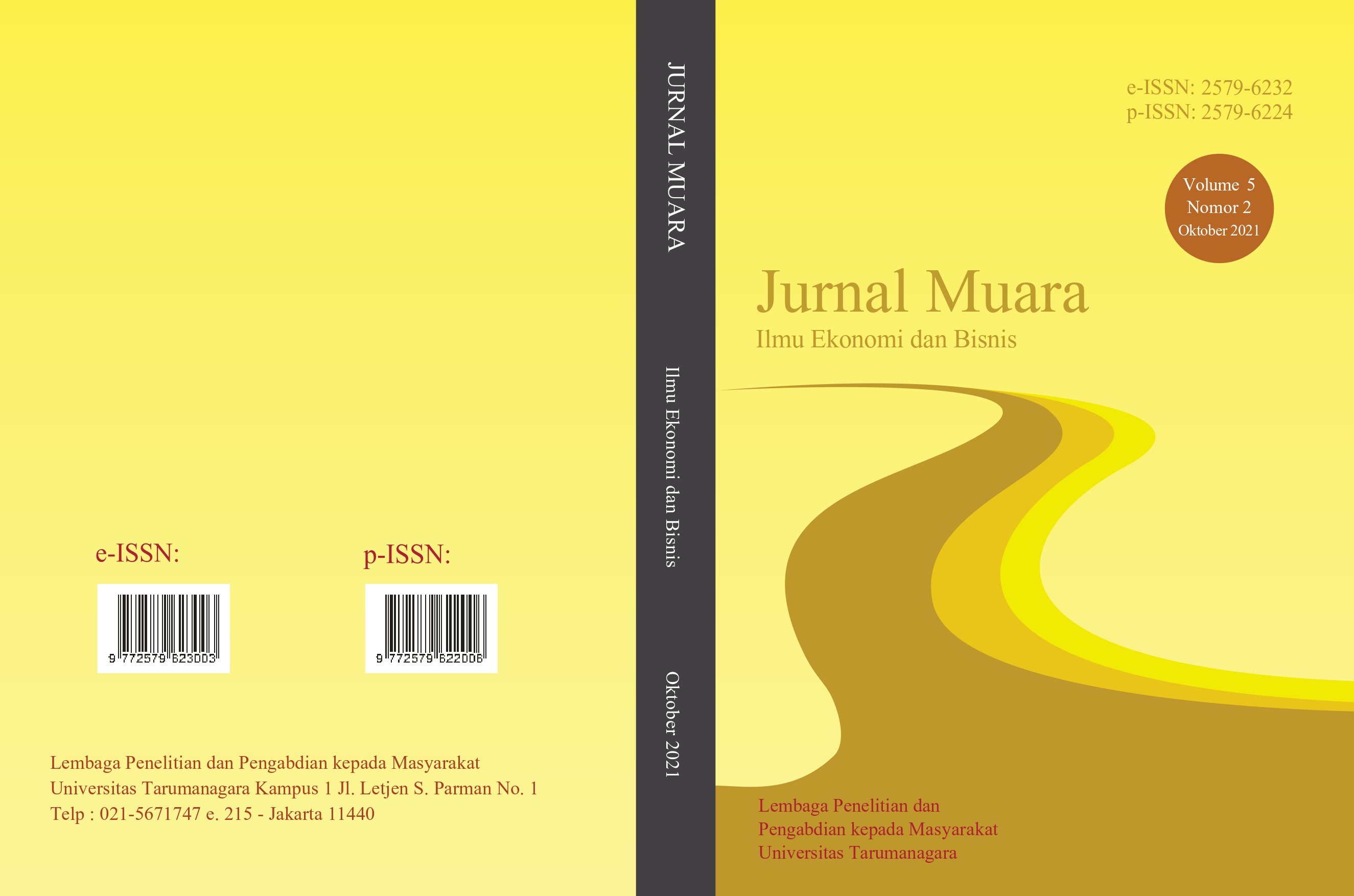LOCAL FOOD ENTREPRENEURSHIP: SEBAGAI MODEL PENGEMBANGAN KEWIRAUSAHAAN BERKELANJUTAN
Main Article Content
Abstract
Selaras dengan Sustainable Development Goals (SDGs), studi ini memiliki relevansi dengan dua sasaran yaitu no poverty dan zero hunger. Hal ini berkaitan dengan kearifan pangan lokal di Kabupaten Kulon Progo, Yogyakarta yaitu “Geblek”. Sampai saat ini makanan khas ini masih dapat diterima oleh masyarakat termasuk milenial di Kulon Progo sehingga sejalan dengan kedua aspek tersebut dilakukan studi tentang potensi “Geblek” sebagai local food entrepreneurship di Kulon Progo. Secara umum tujuan studi adalah mengapresiasi aktivitas komersiel maupun kewirausahaan dalam memperkenalkan “Geblek” sebagai makanan lokal sehingga perlu desain strategi pengembangan usaha dengan basis kewirausahaan berkelanjutan. Dengan demikian dilakukan studi literatur serta pengumpulan data bersama narasumber untuk mengidentifikasi atribut dalam analisis SWOT. Hasil studi mendiskripsikan local food entrepreneurship terkait dengan aktivitas komersiel makanan tradisional khas Kabupaten Kulon Progo. Dilakukan analisis potensi pengembangan local food entrepreneurship melalui analisis SWOT masing-masing empat atribut serta dirancang lima strategi pengembangan local food entrepreneurship. Hasil studi sebagai rekomendasi dalam mengkomersilkan makanan lokal melalui model local food entrepreneurship. Apresiasi ini dapat menghidupkan sektor pertanian serta menjaga kesejahteraan seluruh jaringan supply chain di kawasan pedesaan. Hal ini dirasa penting karena mengandung unsur pelestarian tradisi atau kearifan lokal masyarakat Kulon Progo sehingga relevan dengan misi keberlanjutan dengan orientasi pada keseimbangan antara nilai sosial-budaya, lingkungan hidup dan pertumbuhan ekonomi masyarakat pedesaan.
Article Details
References
Coelho, F.C.; Coelho, E.M.; & Egerer, M. (2018). Local food: Benefits and failings due to modern agriculture. Sci. Agric. 2018, 75, 84–94.
Cohen, B., & Winn, M.I., (2007). Market imperfections, opportunity and sustainable entrepreneurship. Journal of Business Venturing 22, 29–49.
Dean, T. J., & McMullen, J. S. (2007) ‘Toward a Theory of Sustainable Entrepreneurship: Reducing Environmental Degradation Through Entrepreneurial Action’, Journal of Business Venturing, 22, pp. 50–76. doi: 10.1016/j.jbusvent.2005.09.003.
FAO (2014). Sustainable local procurement, Sustainability Pathway, www.fao.org/food- quality-origin
Fizriyani, W (2017). https://www.republika.co.id/berita/gaya-hidup/kuliner/17/03/30/onmjzs328-syarat-makanan-bisa-menjadi-khas-suatu-daerah diakses 25 Februari 2021
Frederick, H.H., Kuratko, D.F., & Hodgetts, R.M. (2006). Entrepreneurship Theory, Process, and Practice, 1st Asia Pasific Edition, Australia Cengage Learning Australia Pty Limited.
Hockerts, K., & Wüstenhagen, R. (2010). Greening Goliaths versus Emerging Davids-Theorizing about the Role of Incumbents and New Entrantsin Sustainable Entrepreneurship, Journal of Business Venturing, 25: 481–492
Koe, Wei-Loon., Omar, Roaimah., & Majid, Izaidin Abdul. (2014). Factors associated with propensity for sustainable entrepreneurship. Procedia-Social and Behavioral Sciences. Vol. 130. 65-74.
Koe, Wei-Loon., Omar, Roaimah., & Sa’ari, Juan Rizal. (2015). Factors influencing propensity
to sustainable entrepreneurship of SMEs in Malaysia. Procedia-Social and Behavioral Sciences. Vol. 172. 570-577.
Kwil, I., Piwowar-Sulej. K., & Krzywonos, M. (2020). Local entrepreneurship in the context of food production: A Review, Sustainability, 12, 424; 1-21. DOI:10.3390/su12010424
Leach, J.C., & Melicher, R.W. (2012) Entrepreneurial Finance, 4th edition, International Edition.
Majid, Izaidin Abdul., & Koe, Wei-Loon. (2012). Sustainable Entrepreneurship (SE): A revised model based on triple bottom line (TBL). International Journal of Academic Research in Business and Social Sciences, June, Vol. 2 No. 6. 293-310.
Mangnus, E. (2019). How inclusive businesses can contribute to local food security, Current Opinion in Environmental Sustainability 2019, 41:69–73.
Mars, M.M., & Schau, H.J. (2018). What is local food entrepreneurship? Variation in the commercially and socially oriented features of entrepreneurship in the Southeastern Arizona Local Food System, Rural Sociology, vol. 83, issue 3, 568-597; https://doi.org/10.1111/ruso.12197.
Marsden, T., & Smith, E. (2005). Ecological entrepreneurship: Sustainable development in local communities through quality food production and local branding, Geoforum, vol. 36, Issue 4, July 2005, 440-451; https://doi.org/10.1016/j.geoforum.2004.07.008.
Nuringsih, K., Nuryasman, M.N., Prasodjo, I., & Amelinda, R. (2019). Sustainable entrepreneurial intention: the perceived of triple bottom line among female students, Jurnal Manajemen, Volume XXIII, no. 02, June, 168-190. DOI: http://dx.doi.org/10.24912/jm.v23i2.472.
Nuringsih, K., Prasodjo, I., & Nuryasman, M.N. (2020). Ensuring local wisdom environmental sustainability through sustainable entrepreneurial development: A conceptual framework for Kulonprogo, Yogyakarta, Advances in Social Science, Education and Humanities Research, vol. 439 Tarumanagara International Conference on the Applications of Social Sciences and Humanities (TICASH 2019), 182-187.
Nuringsih, K., & Nuryasman, MN. (2020). Propensity for Sustainable Entrepreneurship of MSEs Owner in Yogyakarta, Indonesia. In Urban Development and Lifestyle, pp. 131-139. Nova, Social Sciences, Urban Development and Infrastructure, Urban Studies. NY.
Sargani, G. R., Zhou, D., Raza, M.H., & Wei, Y. (2020) Sustainable Entrepreneurship in the Agriculture Sector: The Nexus of the Triple Bottom Line Measurement Approach, Sustainability, 12(3275), pp. 1–24. doi: 10.3390/su12083275.
Schaltegger, S., & Wagner, M. (2011). Sustainable Entrepreneurship and Sustainability Innovation: Categories and Interactions, Business Strategy and the Environment Bus. Strat. Env. 20. 222–237.
Smithers, J., Lamarche, J., & Joseph, A.E. (2008). Unpacking the terms of engagement with local food at the Farmers’ market: insights from Ontario. Journal of Rural Studies 24, 337-350
Strange, T., & A. Bayley. (2008). Sustainable Development Lingking Economy, Society, Environment, retrive: http://www.sjalfbaerni.is/media/frodleikur/OECD-skyrsla.pdf.
Tilley, F., & Young, W. (2009). Sustainability entrepreneur: could they be the true wealth generators of the future? Greener Management International, issue 55, 79-92.
Zimmerer, T.W. Scarborough, N.M. & Wilson, D. (2008). Essentials of Entrepreneirship and Small Business Management, 5th edition, Pearson Education Inc, New Jersey.


